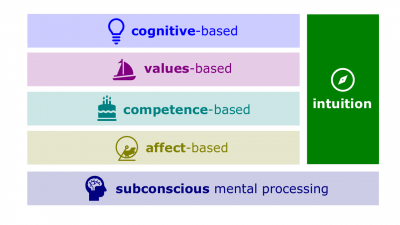Difference between revisions of "Intuition"
(→Related coursework) |
|||
| Line 4: | Line 4: | ||
According to [[Organizational Behavior by Robbins and Judge (17th edition)]], | According to [[Organizational Behavior by Robbins and Judge (17th edition)]], | ||
:[[Intuition]]. An instinctive feeling not necessarily supported by research. | :[[Intuition]]. An instinctive feeling not necessarily supported by research. | ||
| + | According to the [[Strategic Management by David and David (15th edition)]], | ||
| + | :[[Intuition]]. Using one's cognition without evident rational thought or analysis; based on past experience, judgment, and feelings; essential to making good strategic decisions but must not relied upon heavily in lieu of objective analysis. | ||
| + | |||
==Related lectures== | ==Related lectures== | ||
*[[Individual Decisions Quarter]]. | *[[Individual Decisions Quarter]]. | ||
| − | [[Category: Septem Artes Administrativi]][[Category: Articles]] | + | [[Category: Septem Artes Administrativi]][[Category: Articles]][[Category: Strategic Management]] |
Latest revision as of 20:37, 16 July 2020
Intuition is an instinctive feeling not necessarily supported by research.
Definitions
According to Organizational Behavior by Robbins and Judge (17th edition),
- Intuition. An instinctive feeling not necessarily supported by research.
According to the Strategic Management by David and David (15th edition),
- Intuition. Using one's cognition without evident rational thought or analysis; based on past experience, judgment, and feelings; essential to making good strategic decisions but must not relied upon heavily in lieu of objective analysis.
